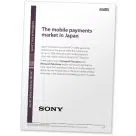Japan’s megabanks aim to introduce unified smartphone payment system — The Mainichi — “MHFG announced that it will soon embark on a verification test of smartphone payments with Toho Bank, headquartered in Fukushima Prefecture, using the barcodes. It is thought that the results of the test will be used to create uniform standards for the two-dimensional barcodes that are currently being mulled by the three banking groups.”
Standards
PCI updates payment device standard to support PIN entry on mobile phones and tablets
PCI Security Standards Council updates payment device standard to support software-based PIN entry on COTS — PCI Security Standards Council — “The updated device standard supports the development of PCI software-based PIN entry on COTS (SPoC) solutions for merchants that enable EMV contact and contactless transactions with PIN entry on commercial off-the-shelf (COTS) devices, such as tablets and smartphones.”
Japan’s major banks to launch QR mobile payments platform
Japanese megabanks team up on mobile payments — Nikkei Asian Review — “Japan’s three megabanks are working together to standardize a smartphone payment system using QR codes… The three banks are also looking at establishing a jointly financed company to oversee the system. Other large banks and smaller regional banks will be invited to join.”
US regulators simplify licensing process for fintechs
State regulators take first step to standardize licensing practices for Fintech payments — Conference of State Bank Supervisors — “Seven states have agreed to a multi-state compact that standardizes key elements of the licensing process for money services businesses (MSB). The agreement: If one state reviews key elements of state licensing for a money transmitter — IT, cybersecurity, business plan, background check, and compliance with the federal Bank Secrecy Act — then other participating states agree to accept the findings… Other states are expected to join this compact.”
GlobalPlatform explains the role of standards in an increasingly diversified payments landscape

The increasing diversity of devices, services and players in the mobile payments ecosystem has led to the need for standards and certification to manage fragmentation, prevent fraud and ensure consistent user experience, GlobalPlatform’s Gil Bernabeu explains in a new paper now available to download from the NFC World Knowledge Centre... More
PCI publishes specifications for PIN entry on mobile phones and tablets
PCI Security Standards Council publishes security requirements for software-based PIN entry on COTS devices — PCI Security Standards Council — “The PCI Software-Based Pin Entry on Cots (SPoC) standard provides requirements for developing secure solutions that enable EMV contact and contactless transactions with pin entry on the merchant’s consumer device using a secure pin entry application in combination with a Secure Card Reader for Pin (SCRP).”
Egypt’s banks to use common QR code standard for mobile payments
CBE issues standard criteria for accepting electronic payment using QR code — Daily News Egypt — “The Central Bank of Egypt (CBE) has issued electronic acceptance criteria for payments through QR code… These unified standards will apply to all banks licensed to accept payments electronically in Egypt.”
UK banks to begin rollout of world’s first standardised open banking system
UK’s Open Banking to launch on 13 January 2018 — Open Banking — “The UK is the first nation to implement a standardised open banking solution. In the UK we are creating a single technology standard enabling new services to be easily built and offered to consumers and small businesses… The first set of Open Banking APIs will go live to third party providers on 13 January.”
EU gives payments industry 18 months to implement strong customer authentication
Payment Services Directive (PSD2): Regulatory Technical Standards (RTS) enabling consumers to benefit from safer and more innovative electronic payments — European Commission — “The RTS makes strong customer authentication (SCA) the basis for accessing one’s payment account, as well as for making payments online. This means that to prove their identity users will have to provide at least two separate elements out of these three: something they know (a password or PIN code); something they own (a card, a mobile phone); and something they are (biometrics, eg fingerprint or iris scan)… The use of SCA will become mandatory 18 months after the entry into force of the RTS, ie once the RTS is published in the Official Journal of the EU, scheduled for September 2019.”
Forum publishes updated NFC technical specs
NFC Forum publishes 2017 technical specification release — NFC Forum — “The 2017 Technical Specifications Release comprises 21 new or updated near field communication technical specifications… The specifications feature the latest NFC technology and usability upgrades that significantly impact and advance functionality in a number of key areas for consumers and businesses.”
UK government expands open banking project to credit cards, e-wallets and prepaid cards
UK’s Open Banking project expanded — Open Banking — “The OBIE [Open Banking Implementation Entity] has now been asked by the CMA9 and Her Majesty’s Treasury to create open banking standards for all payment account types covered by the European Union’s second Payments Services Directive (PSD2). This means customers using credit cards, e-wallets and prepaid cards will also be able to take advantage of open banking services.”
Issuers to adopt common QR code for payments in Singapore from 2018
Common Singapore QR code to be rolled out next year — Channel News Asia — “A common Singapore Quick Response Code (SG QR) will be rolled out and adopted by payment service providers in Singapore next year, the Monetary Authority of Singapore (MAS) said on Monday… Payment services providers in Singapore have also committed to update their mobile payment apps for consumers to read the SG QR. The newly announced NETS QR will be part of SG QR as will other payment service providers such as Singtel Dash QR.”
Sony explains the history, current status and future development of mobile payments in Japan

NFC mobile payments have been a reality in Japan since 2004 when Sony and mobile network operator NTT Docomo formed a joint venture to bring the technology to market... More
EMVCo releases online and in-app transaction security framework
EMVCo launches EMV secure remote commerce technical framework — EMVCo — “EMV SRC will address the complexities and potential vulnerabilities within the remote payments environment by defining a consistent approach to enable the secure transmission and interaction of payment card data among participants. This helps reduce exposure to data compromise and simplify merchant support of these solutions.”
European Payments Council requests feedback on mobile payments interoperability guidelines
Mobile Contactless SEPA Card Payments Interoperability Implementation Guidelines (MCP IIGs) for public consultation — European Payments Council — “The EPC has facilitated the setting-up of a multi-stakeholder group covering the various sectors involved in the mobile payment ecosystem to develop a new version of the Mobile Contactless SEPA Card Payments Implementation Interoperability Guidelines (MCP IIGs), while leveraging the relevant documentation developed in standardisation and industry bodies.”
NFC Forum certifies NFC tag chips from STMicroelectronics

PARTNER NEWS: Three STMicroelectronics ST25 NFC tag chips have been certified for performance and interoperability under the NFC Forum’s new NFC tag certification program, which is designed to ensure “consistent, compelling, and connected user experiences” across NFC tags, readers and handsets... More
Nacha selects first five US payment APIs
Nacha’s API Standardization Industry Group names first five APIs to develop to support payments industry advancement — Nacha — “The API Standardization Industry Group, formally created in spring 2017, is working to further efforts to standardize the use of APIs in the US financial services industry by creating an ‘API playbook’ or standards framework. In support of that effort, during its most recent meeting, the API Standardization Industry Group named the first five APIs — from a larger list of 16 — that it will develop to support payments industry advancement.”
X9 publishes new ANSI tokenization standard
ASC X9 publishes new tokenization standard that enhances security of payment card data in data breaches — X9 — “The Accredited Standards Committee X9 Inc (X9) announced the publication of X9.119 Protection of Sensitive Payment Card Data – Part 2: Implementing Post-Authorization Tokenization Systems. This new ANSI standard defines the minimum security requirements for implementing tokenization in systems that operate after a payment has been approved, to protect sensitive payment card data from data breaches.”
Rambus provides insight into the new EMVCo tokenization specifications
What EMV tokenization 2.0 means for the payments industry — Rambus — PARTNER NEWS — “One particularly positive development is the inclusion of a common set of definitions and terminology in the framework. This may sound simple, but it gives the ecosystem a way to communicate effectively and avoid confusion and delays. Players can now easily understand both the similarities and differences in supporting and implementing EMV tokenization with each of the international and domestic payment schemes.”
EMVCo updates tokenization specification

Payments standards body EMVCo has updated its Payment Tokenisation Technical Framework to introduce the new roles of ‘token programme’ and ‘token user’, refine the roles of ‘token service provider’ and ‘token requestor’ and detail “their interrelationships within the global payments environment.”... More